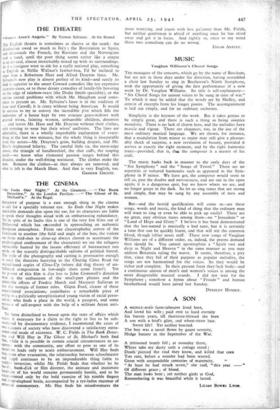THE CINEMA
"So Ends Our Night." At the Gaumont.—" The Bank Detective."i At the London Pavilion.—" The Ghost of St, Michael's." At the Regal.
SINCERITY of purpose is a rare enough thing in the cinema to call for a specially tolerant eye. So Ends Our Night makes charitable demands also upon the ear, for its characters are liable to speak their thoughts aloud with an embarrassing redundancy. Yet in spite of its faults this is one of the very few films out of Hollywood which has setcceeded in approaching an authentic European atmosphere. From one claustrophobic corner of the Continent to another (the field and angle of the lens, the violent cm from mid-shot to close-up always chosen to accentuaie the Psychological confinement of the characters) we see the refugees implacably hunted by the insane efficiency of bureaucracy run amok, or the scarcely distinguishable sadisms of political hatred. The style-of the photography and cutting is provocative enough to send the theorists hurrying to the Charing Cross Road for second-hand copies of Close-Up (where did thaak theory of un- baranced composition in low-angle shots come from?). Yet ' the power of this film is due less to John Cromwell's direction than to the enthusiasm of the small-part players and the admirable efforts of Fredric March and Margaret Sullavan to lose the vestigia of former roles. Glenn Ford, clearer of these remembered associations,- contributes a remarkable piece of acting as a politically unsophisticated young victim of racial perse- cut:on, who finds a place in the world, a passport, and some measure of self-respect with the help of a militant Aryan anti-
To thosq disinclined to brood upon the state of affairs which makes it necessary for a claim to the right to live to be sub- stantiated by documentary evidence, I recommend the cases of Imo outcasts of society who have discovered a satisfactory extra-
; communal mode of existence. W. C. Fields in The Bank Detec- '6ve and Will Hay in- The Ghost of St. Michael's both find , that, While it is possible in certain crucial circumstances to co- °Mate with the community, any effort to pose as one of its - members leads only to acute embarrassment. Will Hay finds that, even after evacuation, the relationship between schoolmaster and pupil continues to be an imponderable thing liable to Ridden inversion; whilst Mr. Fields finds that whether he be bar-fly, bank-dick or film director, the animate and inanimate fon:lit:ire of his world remains permanently hostile, and to be circumvented only by the bold exercise of his nimble fingers and faiev=elephauit brain, accompanied by a rye-laden murmur of Petsmal commentary. Mr. Hay finds his misadventures the more worrying, and jousts with less gallantry than Mr. Fields, but neither gentleman is afraid of anything once he has shied away and got it in focus. And rightly so, since to my mind these two comedians can do no wrong.
EDGAR ANSTEY.


























 Previous page
Previous page